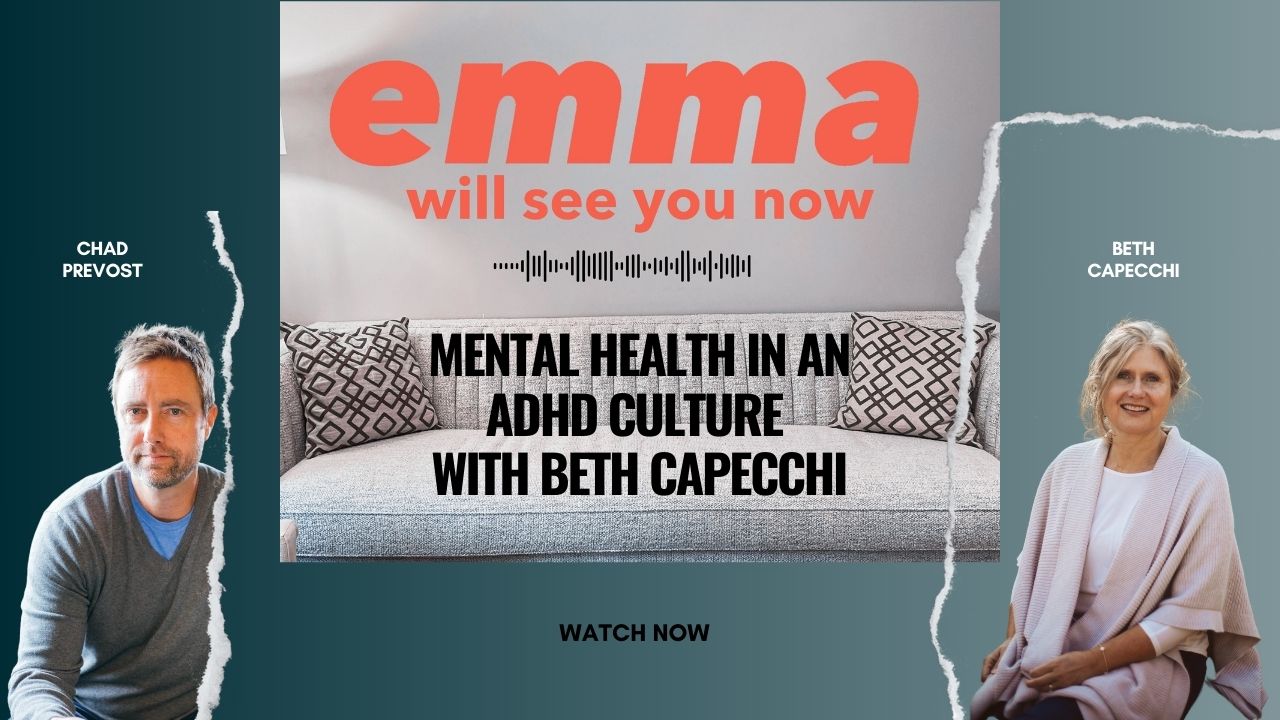Dec 9, 2024
Committing to Mental Health and Self-Awareness: A Conversation with Beth Capecchi
Sharing your story divides the pain in half and helps you realize you’re not alone.
In a candid and thought-provoking conversation on Emma Will See You Now, Dr. Beth Capecchi opens up about navigating the challenges of ADHD and life’s complexities. As a clinical therapist and someone diagnosed with ADHD, Beth offers a unique perspective on living with the condition while balancing personal and professional life.
“There are universal themes that just transcend all time, loneliness, the struggle to feel significant, be connected with people, to find your calling and love yourself and have healthy relationships.”
Beth’s Journey with ADHD
Dr. Beth discusses her long-standing suspicion of having ADHD, which was confirmed by suggestions from colleagues during her doctoral program. She describes being an Enneagram Type 7, and the uncertainty and possibilities that come with it. Despite suspecting the condition, she hesitated to get formally diagnosed for years, only truly confronting it when a client’s book inspired her to self-reflect on the impacts of ADHD on her life.
Understanding ADHD and Its Impact
Dr. Beth provides insight into the challenges ADHD poses, such as time management issues, overcommitting, and trouble prioritizing. Yet, she also appreciates the “superpowers” it offers. She emphasizes self-awareness, understanding one’s own “user’s manual,” and how strategies tailored to personal strengths can lead to more effective coping mechanisms.
Medication and Alternative Treatments
The treatment of ADHD is a multifaceted journey for Beth. She candidly shares her experiences with medications like Vyvanse and Adderall, and their effects. However, integrating holistic approaches like nootropic drinks are areas she is curious to explore further. The balance of using stimulants versus alternatives like coffee reflects the ongoing exploration to manage ADHD effectively.
The Importance of Diagnosis
For Dr. Beth, diagnosis offers a framework for understanding and addressing personal challenges but warns against over-identifying with a diagnosis. She advises on keeping a “working hypothesis” as mental health issues often overlap and evolve. Emphasizing a nuanced perspective, Dr. Beth recognizes both the benefits and potential pitfalls of self-labeling in clinical settings.
Social Media and Modern Challenges
She identifies social media as adding new layers of difficulty to mental health, highlighting issues like FOMO and increased loneliness. The conversation touches on the unrealistic portrayals of life online and their impacts, particularly on social disconnection despite a seemingly connected world.
The Dynamics of Relationships and Men’s Mental Health
Navigating relationships, whether as a therapist or individual, remains central to Dr. Beth’s practice. Gender dynamics often reveal that men may struggle with vulnerability in relationships. Her observations indicate that while women may freely express their emotions, men often face societal pressures that discourage such openness, impacting mental health.
“Sharing your story divides the pain in half and helps you realize you’re not alone.”
Therapeutic Techniques and Personal Healing
She also shares practical therapeutic techniques such as “multiple choice thinking” to counteract cognitive biases and the transformative power of unsent letter-writing for emotional healing. These strategies underline the importance of processing emotions and gaining insights into personal struggles.
Connecting Psychology and Spirituality
The discussion concludes with a discussion of the intersection between spirituality and psychology. Dr. Beth reflects on the soul’s infinite nature and the human longing for fulfillment, suggesting that spiritual grounding can offer a deeper sense of purpose and understanding.
Beth Capecchi’s openness about her experiences with ADHD and her philosophical musings on life provide a meaningful and engaging dialogue. Her insights encourage listeners to explore their own self-awareness and the potential of therapy to navigate life’s complexities. Whether it’s through professional therapy or personal reflection, her journey offers lessons on resilience, understanding, and connection.





